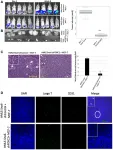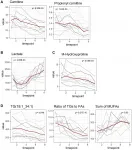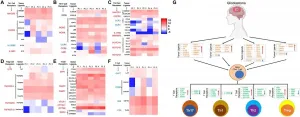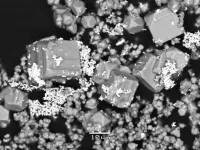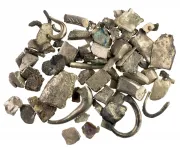(Press-News.org) The theory that modern society is too clean, leading to defective immune systems in children, should be swept under the carpet, according to a new study by researchers at UCL and the London School of Hygiene & Tropical Medicine.
In medicine, the 'hygiene hypothesis' states that early childhood exposure to particular microorganisms protects against allergic diseases by contributing to the development of the immune system.
However, there is a pervading view (public narrative) that Western 21st century society is too hygienic, which means toddlers and children are likely to be less exposed to germs in early life and so become less resistant to allergies.
In this paper, published in the Journal of Allergy and Clinical Immunology, researchers point to four significant reasons which, they say, disprove this theory and conclude we are not "too clean for our own good".
Lead author, Emeritus Professor of Medical Microbiology Graham Rook (UCL Infection & Immunity), said: "Exposure to microorganisms in early life is essential for the 'education' of the immune and metabolic systems.
"Organisms that populate our guts, skin and airways also play an important role in maintaining our health right into old age: so throughout life we need exposure to these beneficial microorganisms, derived mostly from our mothers, other family members and the natural environment.
"But for more than 20 years there has been a public narrative that hand and domestic hygiene practices, that are essential for stopping exposure to disease-causing pathogens, are also blocking exposure to the beneficial organisms.
"In this paper, we set out to reconcile the apparent conflict between the need for cleaning and hygiene to keep us free of pathogens, and the need for microbial inputs to populate our guts and set up our immune and metabolic systems."
In a review of evidence, the researchers point to four factors.
Firstly, the microorganisms found in a modern home are, to a significant degree, not the ones that we need for immunity.
Secondly, vaccines, in addition to protecting us from the infection that they target, do a lot more to strengthen our immune systems*, so we now know that we do not need to risk death by being exposed to the pathogens.
Thirdly, we now have concrete evidence that the microorganisms of the natural green environment are particularly important for our health; domestic cleaning and hygiene have no bearing on our exposure to the natural environment.
Finally, recent research** demonstrates that when epidemiologists find an association between cleaning the home and health problems such as allergies, this is often not caused by the removal of organisms, but rather by exposure of the lungs to cleaning products that cause a type of damage that encourages the development of allergic responses.
Professor Rook added: "So cleaning the home is good, and personal cleanliness is good, but, as explained in some detail in the paper, to prevent spread of infection it needs to be targeted to hands and surfaces most often involved in infection transmission. By targeting our cleaning practices, we also limit direct exposure of children to cleaning agents
"Exposure to our mothers, family members, the natural environment, and vaccines can provide all the microbial inputs that we need. These exposures are not in conflict with intelligently targeted hygiene or cleaning."
INFORMATION:
* Vaccinology: time to change the paradigm? The Lancet Infectious Diseases 2020
** Food allergy as a biological food quality control system. Cell 2021
** Does the epithelial barrier hypothesis explain the increase in allergy, autoimmunity and other chronic conditions? Nature Reviews Immunology 2021
Research published today has demonstrated the viability of 3D-printed tissue scaffolds that harmlessly degrade while promoting tissue regeneration following implantation.
The scaffolds showed highly promising tissue-healing performance, including the ability to support cell migration, the 'ingrowth' of tissues, and revascularisation (blood vessel growth).
Professor Andrew Dove, from the University of Birmingham's School of Chemistry, led the research group and is the lead author on the paper published in Nature Communications, which characterises the physical properties of the scaffolds, and explains how their 'shape memory' is key to promoting tissue regeneration. ...
Flies have discriminating taste. Like a gourmet perusing a menu, they spend much of their time seeking sweet nutritious calories and avoiding bitter, potentially toxic food. But what happens in their brains when they make these food choices?
Yale researchers discovered an interesting way to find out. They tricked them.
In a study that could also help illuminate how people make food choices, the researchers gave hungry fruit flies the choice between sweet, nutritious food laced with bitter quinine and a less sweet, but not bitter, food containing fewer calories. Then, using neuroimaging, they tracked neural activity in their brains as they made these tough choices.
So which won? Calories or better taste?
"It depends on how hungry they are," said Michael Nitabach, professor of ...
Researchers at Uppsala University have discovered lymph node-like structures close to the tumour in brain cancer patients, where immune cells can be activated to attack the tumour. They also found that immunotherapy enhanced the formation of these structures in a mouse model. This discovery suggests new opportunities to regulate the anti-tumour response of the immune system.
Glioma is a deadly brain tumour with a dismal prognosis. One reason why brain tumours are very hard to treat is that our immune system, which is designed to detect and destroy foreign ...
Although most Canadians die from predictable causes and have health needs that can be met at home, only 20% of people receive a physician home visit in their last year of life.
To help understand the changing care needs of older adults as they age and when they might be nearing the end of their lives, a team of researchers developed the Risk Evaluation for Support: Predictions for Elder-Life in the Community Tool (RESPECT).
The calculator, which predicts death within 6 months, is based on data from more than 491 000 community-dwelling older adults who used home care in the 6-year period between 2007 and 2013.
"The RESPECT calculator allows families and their loved ...
Oncotarget published "Carcinoma cells that have undergone an epithelial-mesenchymal transition differentiate into endothelial cells and contribute to tumor growth" which reported that the authors investigated whether EMT can confer endothelial attributes upon carcinoma cells, augmenting tumor growth and vascularization.
Hypoxic regions, demarcated by HIF-1α staining, exhibited focal areas of E-cadherin loss and elevated levels of vimentin and the EMT-mediator FOXC2. Implantation of MCF-7 cells, co-mixed with human mammary epithelial cells overexpressing the EMT-inducer Snail, markedly ...
Oncotarget published "Perioperative changes in the plasma metabolome of patients receiving general anesthesia for pancreatic cancer surgery" which reported that little is known about the impact of anesthesia on the plasma metabolome, although many metabolites have been shown to modulate the function of various immune cells, making it particularly interesting in the context of oncological surgery.
In this study longitudinal dynamics in the plasma metabolome during general anesthesia in patients undergoing pancreatic surgery were analyzed.
Prospective, observational study with 10 patients diagnosed with pancreatic malignancy and subjected to elective resection surgery under general anesthesia.
Plasma metabolites were quantified at ...
Oncotarget published "Genome wide DNA methylation landscape reveals glioblastoma's influence on epigenetic changes in tumor infiltrating CD4+ T cells" which reported that whole-genome bisulfite sequencing of tumor infiltrating and blood CD4 T-cell from GBM patients showed 13571 differentially methylated regions and a distinct methylation pattern of methylation of tumor infiltrating CD4 T-cells with significant inter-patient variability.
The methylation changes also resulted in transcriptomic changes with 341 differentially expressed genes in CD4 tumor infiltrating T-cells compared to blood.
Analysis of specific genes involved in CD4 differentiation and function revealed differential methylation status of TBX21, GATA3, RORC, FOXP3, IL10 and ...
Inadequate exposure to UVB light from the sun may be associated with an increased risk of colorectal cancer, particularly in older age groups, according to a study using data on 186 countries, published in the open access journal BMC Public Health.
Researchers at the University of California San Diego, USA investigated possible associations between global levels of UVB light in 2017 and rates of colorectal cancer for different countries and age groups in 2018.
The authors found that lower UVB exposure was significantly correlated with higher rates of colorectal cancer across all ...
Why are gold deposits found at all? Gold is famously unreactive, and there seems to be little reason why gold should be concentrated, rather than uniformly scattered throughout the Earth's crust. Now an international group of geochemists have discovered why gold is concentrated alongside arsenic, explaining the formation of most gold deposits. This may also explain why many gold miners and others have been at risk from arsenic poisoning. This work is presented at the Goldschmidt conference, after recent publication*.
Gold has been prized for millennia, for its purity and stability. It's also rare enough to retain its value - the World Gold Council estimates that all the gold ever mined in the world would fit into a 20x20x20-meter cube. It is valued for its beauty, but also because it ...
Scientists have reconstructed the Eastern Mediterranean silver trade, over a period including the traditional dates of the Trojan War, the founding of Rome, and the destruction of Solomon's Temple in Jerusalem. The team of French, Israeli and Australian scientists and numismatists found geochemical evidence for pre-coinage silver trade continuing throughout the Mediterranean during the Late Bronze and Iron Age periods, with the supply slowing only occasionally. Silver was sourced from the whole north-eastern Mediterranean, and as far away as the Iberian ...
